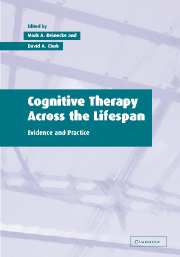Book contents
- Frontmatter
- Contents
- List of contributors
- Foreword
- 1 Cognitive therapy across the lifespan: conceptual horizons
- 2 Cognitive theory and therapy of depression
- 3 Cognitive theory and therapy of bipolar disorders
- 4 Regulation of emotion in generalized anxiety disorder
- 5 Cognitive theory and therapy of obsessions and compulsions
- 6 The cognitive model of panic
- 7 Treating obsessional problems using cognitive-behavioral therapy
- 8 Narcissistic personality disorder
- 9 Cognitive therapy and the self
- 10 Promoting cognitive change in posttraumatic stress disorder
- 11 Cognitive theory and therapy of social phobia
- 12 The cognitive model of bulimia nervosa
- 13 Cognitive therapy and schizophrenia
- 14 Cognitive-behavioral interventions for alcohol abuse and dependence
- 15 Cognitive approaches to understanding, preventing and treating child and adolescent depression
- 16 Cognitive-behavioral interventions in childhood anxiety disorders
- 17 Attention deficit/hyperactivity disorder
- 18 Cognitive-behavioral interventions for children with conduct problems
- 19 Processes of change in cognitive therapy
- 20 Cognitive therapy in the twenty-first century: current status and future directions
- Index
13 - Cognitive therapy and schizophrenia
Published online by Cambridge University Press: 05 July 2014
- Frontmatter
- Contents
- List of contributors
- Foreword
- 1 Cognitive therapy across the lifespan: conceptual horizons
- 2 Cognitive theory and therapy of depression
- 3 Cognitive theory and therapy of bipolar disorders
- 4 Regulation of emotion in generalized anxiety disorder
- 5 Cognitive theory and therapy of obsessions and compulsions
- 6 The cognitive model of panic
- 7 Treating obsessional problems using cognitive-behavioral therapy
- 8 Narcissistic personality disorder
- 9 Cognitive therapy and the self
- 10 Promoting cognitive change in posttraumatic stress disorder
- 11 Cognitive theory and therapy of social phobia
- 12 The cognitive model of bulimia nervosa
- 13 Cognitive therapy and schizophrenia
- 14 Cognitive-behavioral interventions for alcohol abuse and dependence
- 15 Cognitive approaches to understanding, preventing and treating child and adolescent depression
- 16 Cognitive-behavioral interventions in childhood anxiety disorders
- 17 Attention deficit/hyperactivity disorder
- 18 Cognitive-behavioral interventions for children with conduct problems
- 19 Processes of change in cognitive therapy
- 20 Cognitive therapy in the twenty-first century: current status and future directions
- Index
Summary
Aaron Beck and his contemporaries developed cognitive therapy for the treatment of major depression several decades ago. Barlow, Clark, and others soon applied these models to other clinical conditions, including obsessive-compulsive disorder and panic disorder. Compared to these efforts, cognitive therapy for schizophrenia is a relatively new enterprise. In some ways, the idea of applying cognitive therapy in the treatment of schizophrenia seems to exceed the relatively clear and bounded constructs developed in research on cognitive therapy for depression and anxiety. Nevertheless, cognitive models are by no means novel for understanding the disorder. From its earliest formulations by Bleuler and Kraepelin, schizophrenia was described as a thought disorder. Since then, a variety of rehabilitation treatments have been proposed as adjuncts to psychotropic medications for treating the cognitive deficits of schizophrenia (Corrigan and Yudof sky, 1996). Still, one might think there are significant differences between cognitive deficits in schizophrenia (Steffy, 1993) and those associated with depression and anxiety (Clark et al., 1999). The former, for example, is typically viewed as representing a neuro developmental deficit that arises prodromally during childhood and manifests acutely with psychotic symptoms during later adolescence and early adulthood. In contrast, the cognitive deficits of depression and anxiety represent self- and world-conceptualizations that affect one's mood and consequent behavior. Hence, one might reasonably ask, does schizophrenia belong in a book on cognitive therapy? In answering this question, we begin the chapter by considering the similarities and differences between constructs used in understanding cognitive deficits associated with schizophrenia, depression, and anxiety disorders.
- Type
- Chapter
- Information
- Cognitive Therapy across the LifespanEvidence and Practice, pp. 315 - 332Publisher: Cambridge University PressPrint publication year: 2003
- 1
- Cited by

